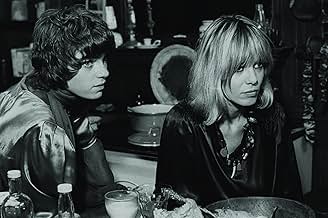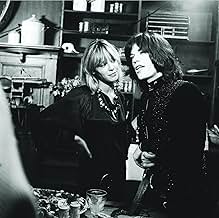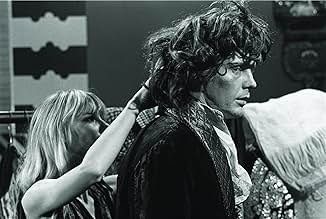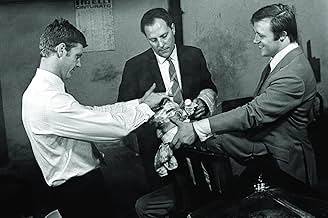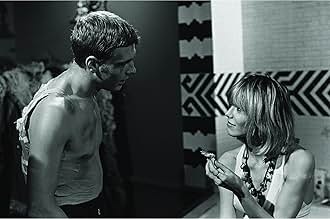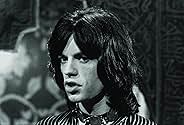AVALIAÇÃO DA IMDb
6,7/10
12 mil
SUA AVALIAÇÃO
Um violento gângster do leste de Londres passa por uma transformação de identidade enquanto se esconde de seus antigos colegas na casa de um astro do rock boêmio e suas duas namoradas.Um violento gângster do leste de Londres passa por uma transformação de identidade enquanto se esconde de seus antigos colegas na casa de um astro do rock boêmio e suas duas namoradas.Um violento gângster do leste de Londres passa por uma transformação de identidade enquanto se esconde de seus antigos colegas na casa de um astro do rock boêmio e suas duas namoradas.
- Direção
- Roteirista
- Artistas
- Indicado para 1 prêmio BAFTA
- 1 indicação no total
Michèle Breton
- Lucy
- (as Michele Breton)
Anthony Morton
- Dennis
- (as Antony Morton)
Kenneth Colley
- Tony Farrell
- (as Ken Colley)
Edmond Bennett
- Detective Sergeant
- (não creditado)
Helen Booth
- Noel's mum
- (não creditado)
John Caesar
- Ticket Clerk
- (não creditado)
Jay Denyer
- Constable
- (não creditado)
Avaliações em destaque
Thirty years after its release 'Performance' still remains one of the most controversial movies of the 60s/70s. For many it is an arty pretentious bore that is only worth remembering for being a mother lode of imagery that has been mined extensively by MTV "talents" over the last twenty years. (Cammell/Roeg must be up there with Bunuel and Kenneth Anger as the most plagiarized source for rock video!)
For the rest of us 'Performance' could well be THE great movie of the psychedelic era, rivaled only by Antonioni's 'Blow Up' and Jodorowky's 'El Topo'. 'Performance' merges the hard boiled Cockney gangster world of the Kray twins (exemplified by James Fox's brutal Chas) with the freaks of the rock/drug world (Jagger's enigmatic Turner) and shows they have as much in common as they differ. Reality and fantasy blur, gender and personas get confused, and Chas and Turner become increasingly hard to tell apart.
All of this unfolds to an ultra-cool soundtrack of The Last Poets, Randy Newman, Jagger's lost classic 'Memo From Turner' and former Spector/Stones/Crazy Horse collaborator Jack Nietsche's Moog. Add to this plenty of sex, trips and Jorge Luis Borges references, and you've got yourself a mind-blowing movie experience!! Highly recommended to Grant Morrison fans.
For the rest of us 'Performance' could well be THE great movie of the psychedelic era, rivaled only by Antonioni's 'Blow Up' and Jodorowky's 'El Topo'. 'Performance' merges the hard boiled Cockney gangster world of the Kray twins (exemplified by James Fox's brutal Chas) with the freaks of the rock/drug world (Jagger's enigmatic Turner) and shows they have as much in common as they differ. Reality and fantasy blur, gender and personas get confused, and Chas and Turner become increasingly hard to tell apart.
All of this unfolds to an ultra-cool soundtrack of The Last Poets, Randy Newman, Jagger's lost classic 'Memo From Turner' and former Spector/Stones/Crazy Horse collaborator Jack Nietsche's Moog. Add to this plenty of sex, trips and Jorge Luis Borges references, and you've got yourself a mind-blowing movie experience!! Highly recommended to Grant Morrison fans.
Gangster James Fox (Chas) quite correctly exacts revenge on fellow bad-guy Anthony Valentine (Joey). But, this goes against the wishes of his boss Johnny Shannon (Harry) and so he has to go into hiding to prepare his escape from the country. The police are also looking for him although they don't figure at all in this film. Fox holes up in a house owned by faded rock star Mick Jagger (Turner) which he shares with a couple of druggy hippie chicks – Anita Pallenberg (Pherber) and Michèle Breton (Lucy). These three swap philosophies and indulge in a spot of identity swapping as well as a magic mushroom breakfast. Fox goes on a trip and he and Jagger truly become one. Meanwhile the gangsters are still searching for Fox
This film definitely has 2 parts – the beginning gangster story and then the unworldly lodgings with Jagger. The latter part of the film is quite amusing and both my wife and I commented that we should spend all our afternoons like that, especially when they are partying to the music. Let's all get a bit boho. I'm sure there are things to spot on another viewing. The cast are good although Johnny Shannon (Harry) doesn't quite cut it as top dog. His surname is Flowers, though, which suggests a pansy in charge – and the Krays are obviously given another nod in this offering by look-a-like gangsters.
Both lifestyles no longer survive – the gangster world is totally different as is the bohemian lifestyle on show. Who does mushrooms these days? Back in the day, though .
This film definitely has 2 parts – the beginning gangster story and then the unworldly lodgings with Jagger. The latter part of the film is quite amusing and both my wife and I commented that we should spend all our afternoons like that, especially when they are partying to the music. Let's all get a bit boho. I'm sure there are things to spot on another viewing. The cast are good although Johnny Shannon (Harry) doesn't quite cut it as top dog. His surname is Flowers, though, which suggests a pansy in charge – and the Krays are obviously given another nod in this offering by look-a-like gangsters.
Both lifestyles no longer survive – the gangster world is totally different as is the bohemian lifestyle on show. Who does mushrooms these days? Back in the day, though .
Visually compelling and disturbing look at two diverse sides of 1960s London; the criminal underworld and hippie culture, respectively symbolised by Fox's Chas, the wayward gangster, and Jagger's Turner, a semi-retired bisexual rock musician.
It's Chas' world we are first introduced to during a highly charged furiously paced scene of gangland violence. It soon becomes clear to us that he is not only an outcast to society but also dangerously individual within his own mob circle. On the run from both the law and the mob he takes refuge in a Notting Hill home which he finds is occupied by Turner, his junkie girlfriend, Pherber, and her French lover, Lucy. Tunrer becomes infatuated with Chas' violent charisma and his "vital energy" he himself feels he has lost.
As the title suggests the film is all about performances. Chas is initiated into Turner's underground world of drug experimentation and gender bending. Turner's name in itself is symbolic of the way he tries to play with and turn Chas' psyche around. It is ultimately the "performance" of Turner which brings the two worlds together, as he poses as Chas' mobster boss, Harry Flowers, in a scene shot similarly to a modern day music video.
Some critics had felt the film lost its way once Chas entered Turner's world. Yet surely such disorientation is indicative of how the film successfully explores Chas' own uneasiness in confronting his own subconscious in an alien atmosphere. The film is full of visual flourishes as one might expect from Roeg, who had been cinemaphotographer on films such as 'Fahrenheit 451'. Fox is mesmerising playing out the evolving identities of Chas, whilst Jagger's persona is exhibited to its full potential. Roeg was again to explore the theme of alienation using a rock star (this time David Bowie) in a more literal sense in his landmark science fiction film 'The Man Who Fell To Earth'.
It's Chas' world we are first introduced to during a highly charged furiously paced scene of gangland violence. It soon becomes clear to us that he is not only an outcast to society but also dangerously individual within his own mob circle. On the run from both the law and the mob he takes refuge in a Notting Hill home which he finds is occupied by Turner, his junkie girlfriend, Pherber, and her French lover, Lucy. Tunrer becomes infatuated with Chas' violent charisma and his "vital energy" he himself feels he has lost.
As the title suggests the film is all about performances. Chas is initiated into Turner's underground world of drug experimentation and gender bending. Turner's name in itself is symbolic of the way he tries to play with and turn Chas' psyche around. It is ultimately the "performance" of Turner which brings the two worlds together, as he poses as Chas' mobster boss, Harry Flowers, in a scene shot similarly to a modern day music video.
Some critics had felt the film lost its way once Chas entered Turner's world. Yet surely such disorientation is indicative of how the film successfully explores Chas' own uneasiness in confronting his own subconscious in an alien atmosphere. The film is full of visual flourishes as one might expect from Roeg, who had been cinemaphotographer on films such as 'Fahrenheit 451'. Fox is mesmerising playing out the evolving identities of Chas, whilst Jagger's persona is exhibited to its full potential. Roeg was again to explore the theme of alienation using a rock star (this time David Bowie) in a more literal sense in his landmark science fiction film 'The Man Who Fell To Earth'.
Here is a movie that cannot be classified in any subcategory. Many viewers of now and then seemed to be disturbed by its lack of evident meaning or message. Starting more or less like a gangster flick, it abruptly turns halfway through into a psychedelic trip, where Mick Jagger appears, in one of his rare screen roles, as a retired rock star.
No doubt, "Performance" doesn't do much effort to be easily understood. If you like stories with a clear plot, well defined characters and a happy ending, then skip this one. In order to enjoy that movie, you should better give up your rationality for a while. There are many interpretations one can have about it, but they will most likely come in the second run. Like a dream, "Performance" is a visual and mental shock where nothing comes as expected, and it lets you wake up dazed and confused by its so peculiar atmosphere.
What I find most puzzling about it is how far ahead of its time this movie was in every aspect. It was shot in 1968, but released only two years later because the distributors were obviously not prepared for this kind of "performance", and had not seen anything alike before. Western society was undergoing incredibly fast and drastic mutations, and the culture shock that happened in those days is at the very heart of the picture. It was "time for a change". Just like the main character, the western world would never be the same again afterwards.
Interesting fact : a mere five years before, the lead actor James Fox had played in "the Servant", a film based on a play by Harold Pinter with a story that has a lot in common with "Performance". "The Servant" appeared highly controversial by then because of its allusions to seedy sex, but it was shot in black and white with very conventional filming, editing and acting, and a very outdated jazzy soundtrack. Hard to believe it takes place in the same city (London) with the same lead actor within just a five year gap.
Nothing about "Performance" is conventional. It takes off immediately into a hectic pace, flashy colors, haunting music, and very graphic sex and violence. The London crime world is photographed with a rare accuracy. Actually, one of the guys playing the gangsters happened to be a real life gangster. Then suddenly, by a random twist of fate, the cockney villain (no heroes here) is propelled into another completely different underground scene, where "nothing is true, everything is permitted". He meets his alter ego as a has-been pop musician living secluded in a red-walled mansion covered with mirrors, together with a duet of intriguing women. Hallucinogenic mushrooms are casually served at breakfast, notions of time and space fade away, while gender, identity and truth get blurred. The two main characters gradually merge together and though both of them seemingly get doomed by their fate in the end, you don't know by then which of them is whom anymore.
I don't know of any other movie where you see a Rolls Royce burning down in an acid bath, gangsters performing a strip-tease show, or a plunging view inside a skull as a bullet is shot through it, least all of them together. Besides, the recurring use of mirrors all throughout the picture, the constant play with colors and the superimposing of faces and images don't have many parallels either in film history.
Of course, if you are a Rolling Stones fan, this movie is a must-see, but then you probably have seen it already. Like the main character, the Rolling Stones began as English street kids, and came to explore a world of sex, drugs and rock&roll where one of them actually lost his life. In "Performance" , an androgynous long-haired Mick Jagger with pouting lips is at the acme of his character, while blond and foxy Anita Pallenberg, who had affairs with three members of the band, and freckled boyish Michèle Breton fit perfectly into the scenery .
If there was to be a "pop-art" movie, that would be it. You may love or hate this film, but for sure, it is daringly creative and experimental, and anything but ordinary. To quote the character played by Jagger : "the only performance that makes it, that really makes it, is the one that achieves madness".
No doubt, "Performance" doesn't do much effort to be easily understood. If you like stories with a clear plot, well defined characters and a happy ending, then skip this one. In order to enjoy that movie, you should better give up your rationality for a while. There are many interpretations one can have about it, but they will most likely come in the second run. Like a dream, "Performance" is a visual and mental shock where nothing comes as expected, and it lets you wake up dazed and confused by its so peculiar atmosphere.
What I find most puzzling about it is how far ahead of its time this movie was in every aspect. It was shot in 1968, but released only two years later because the distributors were obviously not prepared for this kind of "performance", and had not seen anything alike before. Western society was undergoing incredibly fast and drastic mutations, and the culture shock that happened in those days is at the very heart of the picture. It was "time for a change". Just like the main character, the western world would never be the same again afterwards.
Interesting fact : a mere five years before, the lead actor James Fox had played in "the Servant", a film based on a play by Harold Pinter with a story that has a lot in common with "Performance". "The Servant" appeared highly controversial by then because of its allusions to seedy sex, but it was shot in black and white with very conventional filming, editing and acting, and a very outdated jazzy soundtrack. Hard to believe it takes place in the same city (London) with the same lead actor within just a five year gap.
Nothing about "Performance" is conventional. It takes off immediately into a hectic pace, flashy colors, haunting music, and very graphic sex and violence. The London crime world is photographed with a rare accuracy. Actually, one of the guys playing the gangsters happened to be a real life gangster. Then suddenly, by a random twist of fate, the cockney villain (no heroes here) is propelled into another completely different underground scene, where "nothing is true, everything is permitted". He meets his alter ego as a has-been pop musician living secluded in a red-walled mansion covered with mirrors, together with a duet of intriguing women. Hallucinogenic mushrooms are casually served at breakfast, notions of time and space fade away, while gender, identity and truth get blurred. The two main characters gradually merge together and though both of them seemingly get doomed by their fate in the end, you don't know by then which of them is whom anymore.
I don't know of any other movie where you see a Rolls Royce burning down in an acid bath, gangsters performing a strip-tease show, or a plunging view inside a skull as a bullet is shot through it, least all of them together. Besides, the recurring use of mirrors all throughout the picture, the constant play with colors and the superimposing of faces and images don't have many parallels either in film history.
Of course, if you are a Rolling Stones fan, this movie is a must-see, but then you probably have seen it already. Like the main character, the Rolling Stones began as English street kids, and came to explore a world of sex, drugs and rock&roll where one of them actually lost his life. In "Performance" , an androgynous long-haired Mick Jagger with pouting lips is at the acme of his character, while blond and foxy Anita Pallenberg, who had affairs with three members of the band, and freckled boyish Michèle Breton fit perfectly into the scenery .
If there was to be a "pop-art" movie, that would be it. You may love or hate this film, but for sure, it is daringly creative and experimental, and anything but ordinary. To quote the character played by Jagger : "the only performance that makes it, that really makes it, is the one that achieves madness".
Reading the various comments posted, I'm saddened to see that Nic Roeg is receiving the credit for this amazing film. Granted, Roeg did provide his always stunning camera work to the film, but it was Donald Cammell who wrote, directed the actors, and edited (along with Frank Mazzola) PERFORMANCE.
Roeg acted as DP on the film, blocking the camera movements as Cammell worked with the actors. In fact, according to Cammell, they worked so well together that people would comment "...the two director approach is the wave of the future." Cammell also revealed that his admiration for Roeg's work was somewhat tempered by the fact that Roeg was often solely credited for PERFORMANCE, something that just isn't true.
Don't get me wrong, I think Nic Roeg is a wonderful director and a brilliant DP. DON'T LOOK NOW, THE MAN WHO FELL TO EARTH, and BAD TIMING are some of my favorite films, but PERFORMANCE is Cammell's vision more than Roeg's.
In fact, given the ironic and tragic life that Cammell led, perhaps it's only fitting that he would be overlooked for his work on PERFORMANCE, which displays his obsessions for Borges, gender/identity, and sexuality.
Any interest? Seek out DONALD CAMMELL: THE ULTIMATE PERFORMANCE for a fascinating look at this brilliant artist.
Roeg acted as DP on the film, blocking the camera movements as Cammell worked with the actors. In fact, according to Cammell, they worked so well together that people would comment "...the two director approach is the wave of the future." Cammell also revealed that his admiration for Roeg's work was somewhat tempered by the fact that Roeg was often solely credited for PERFORMANCE, something that just isn't true.
Don't get me wrong, I think Nic Roeg is a wonderful director and a brilliant DP. DON'T LOOK NOW, THE MAN WHO FELL TO EARTH, and BAD TIMING are some of my favorite films, but PERFORMANCE is Cammell's vision more than Roeg's.
In fact, given the ironic and tragic life that Cammell led, perhaps it's only fitting that he would be overlooked for his work on PERFORMANCE, which displays his obsessions for Borges, gender/identity, and sexuality.
Any interest? Seek out DONALD CAMMELL: THE ULTIMATE PERFORMANCE for a fascinating look at this brilliant artist.
Você sabia?
- CuriosidadesAccording to Anita Pallenberg, one scene actually shows her shooting heroin, which she was just starting to get into at the time.
- Versões alternativasIn most versions the voices of Johnny Shannon, John Bindon and Laraine Wickens have been overdubbed. This was because the actors' own voices were thought to be "too cockney" for non-UK audiences to understand. The 2007 Region 2 DVD (DY11687) features the voices of all three actors throughout the feature, none of the previous overdubs are present in this version.
- ConexõesFeatured in Memo from Turner (1970)
Principais escolhas
Faça login para avaliar e ver a lista de recomendações personalizadas
- How long is Performance?Fornecido pela Alexa
Detalhes
- Data de lançamento
- País de origem
- Idioma
- Também conhecido como
- The Performers
- Locações de filme
- Empresa de produção
- Consulte mais créditos da empresa na IMDbPro
Bilheteria
- Orçamento
- £ 750.000 (estimativa)
- Tempo de duração1 hora 45 minutos
- Cor
- Mixagem de som
- Proporção
- 1.85 : 1
Contribua para esta página
Sugerir uma alteração ou adicionar conteúdo ausente

Principal brecha
By what name was Performance (1970) officially released in India in English?
Responda

